Every year, millions of people reach for ibuprofen or naproxen to ease a headache, back pain, or arthritis flare-up. These drugs work fast. But what most users don’t realize is that NSAID use isn’t harmless-even when taken as directed. Behind the relief lies a quiet, often invisible risk: damage to the stomach, intestines, and kidneys that can build up over weeks or months, sometimes without warning.
How NSAIDs Harm Your Gut
NSAIDs don’t just block pain signals. They shut down a key group of enzymes called COX-1 and COX-2. COX-2 helps reduce inflammation, which is why these drugs work for arthritis or sprains. But COX-1 is just as important-it keeps the lining of your stomach and intestines protected by producing prostaglandins. These chemicals maintain mucus, blood flow, and cell repair in the GI tract.When you take an NSAID, you’re removing that protection. The result? The stomach lining becomes vulnerable. This isn’t just about heartburn. Up to 50% of people who take NSAIDs long-term develop visible damage to the stomach or intestinal lining, even if they feel fine. About 15% will end up with peptic ulcers-open sores that can bleed silently or rupture.
And here’s the scary part: half of these cases show no symptoms until it’s too late. You might not feel pain. No nausea. No indigestion. Then suddenly, you’re dizzy, weak, or passing black, tarry stools. That’s internal bleeding. In the U.S. alone, NSAIDs cause more than 100,000 hospitalizations and 16,500 deaths every year from GI complications.
The Silent Kidney Threat
Your kidneys rely on prostaglandins to keep blood flowing through them, especially when you’re dehydrated, sick, or taking other medications like diuretics or blood pressure drugs. NSAIDs block those prostaglandins. That’s fine for a healthy person taking one pill now and then. But for someone with existing kidney issues, older adults, or those with heart failure, this can trigger acute kidney injury.Studies show 1% to 5% of NSAID users develop sudden kidney problems. For people over 65, the risk jumps significantly. The FDA now requires a boxed warning on all prescription NSAIDs about this exact danger. Chronic use can lead to interstitial nephritis, fluid retention, high blood pressure, and even permanent loss of kidney function. In some cases, the damage is irreversible.
Many patients don’t know their kidneys are under stress until a routine blood test shows rising creatinine levels. That’s why checking kidney function isn’t optional-it’s essential.
Who’s at Highest Risk?
Not everyone faces the same level of danger. Certain factors stack the deck against you:- Age 65 or older
- History of stomach ulcers or GI bleeding
- Taking blood thinners like warfarin or aspirin
- Using corticosteroids (like prednisone)
- Having kidney disease, heart failure, or high blood pressure
- Drinking alcohol regularly
- Taking multiple NSAIDs at once (e.g., ibuprofen + naproxen)
Doctors use a simple scoring system to measure risk. If you have two or more of these factors, you’re in the high-risk group. That means you shouldn’t just take NSAIDs without a plan.
Monitoring: What You Need to Check
If you’re on NSAIDs for more than a few weeks, you need monitoring. Not just when you feel bad-regularly, even if you feel fine.- Serum creatinine and BUN: Get tested within 30 days of starting and then every 3-6 months if you’re on long-term therapy. A rise of 0.3 mg/dL or more in creatinine signals trouble.
- Complete blood count (CBC): Checks for anemia, which can mean slow, unnoticed bleeding in the gut.
- Fecal occult blood test: Recommended every 6 months for high-risk patients. It detects tiny amounts of blood in stool that you can’t see.
- Blood pressure: NSAIDs can cause or worsen hypertension. Monitor regularly if you’re on these drugs long-term.
Many patients never get these tests. A 2023 Medicare analysis found only 52% of long-term NSAID users had their kidney function checked within 90 days of starting. That’s not safe.
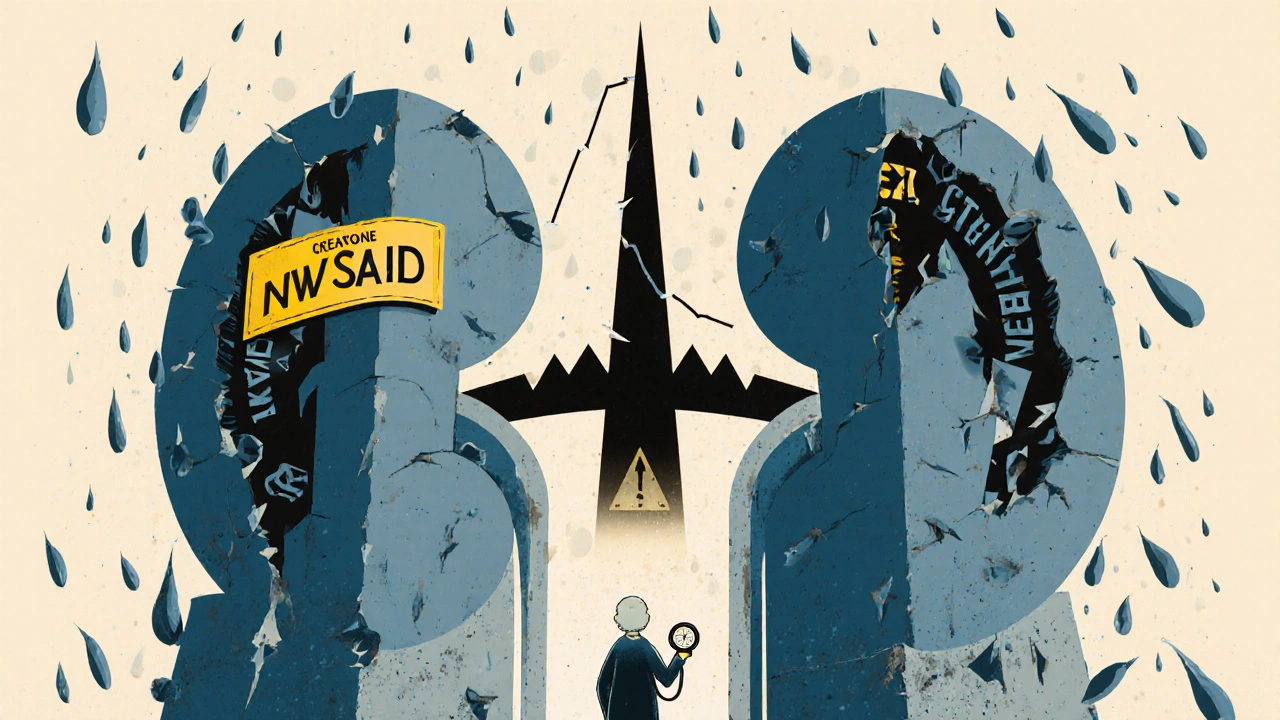
NSAID Types: Not All Are Equal
Some NSAIDs are riskier than others. Here’s what the data says:| NSAID | GI Bleeding Risk (vs. non-users) | Kidney Risk | Notes |
|---|---|---|---|
| Naproxen | 4.2x higher | High | Longer half-life = prolonged exposure |
| Ibuprofen | 2.7x higher | Medium | Common OTC choice; higher risk with daily use |
| Celecoxib (COX-2 selective) | 1.9x higher | Medium | Lower GI risk, but still affects kidneys |
| Diclofenac | 3.5x higher | High | Restricted in Europe due to heart risks |
COX-2 inhibitors like celecoxib were designed to be gentler on the stomach-and they are. But they’re not magic. They still raise blood pressure, strain the kidneys, and carry cardiovascular risks. And they don’t protect the lower intestines at all.
What About PPIs? Are They the Answer?
Many doctors prescribe proton pump inhibitors (PPIs) like omeprazole alongside NSAIDs to protect the stomach. And yes-they reduce ulcer risk by 70-90%. But here’s what most people don’t know: PPIs aren’t harmless either.Long-term use of PPIs with NSAIDs increases the risk of microscopic colitis by more than six times. That’s inflammation of the colon that causes chronic diarrhea. It’s hard to diagnose and often mislabeled as IBS. Also, PPIs don’t help the lower GI tract. NSAID-induced damage in the small intestine and colon still happens, even with a PPI in place.
And if you’re taking an SSRI antidepressant? The risk of GI bleeding jumps 3.4 times. That combination is a red flag.
Real Stories, Real Consequences
Patient reports tell a consistent story. On WebMD, 42% of negative reviews for ibuprofen mention sudden stomach bleeding with no warning. On Reddit, users describe diarrhea lasting days after stopping naproxen, fatigue from hidden blood loss, and swelling in the legs from kidney fluid retention.One 72-year-old woman with osteoarthritis took naproxen daily for two years. She felt fine. Then she collapsed from anemia. Her hemoglobin was 7.2-down from 13.5. An endoscopy found multiple bleeding ulcers. She had no pain. No nausea. Just weakness.
Another man, 68, took celecoxib and omeprazole for five years. His kidney function dropped steadily. By the time he stopped, his eGFR was 42. He now needs monthly monitoring. He says: “I thought the PPI was keeping me safe. I had no idea the damage was happening below the stomach.”
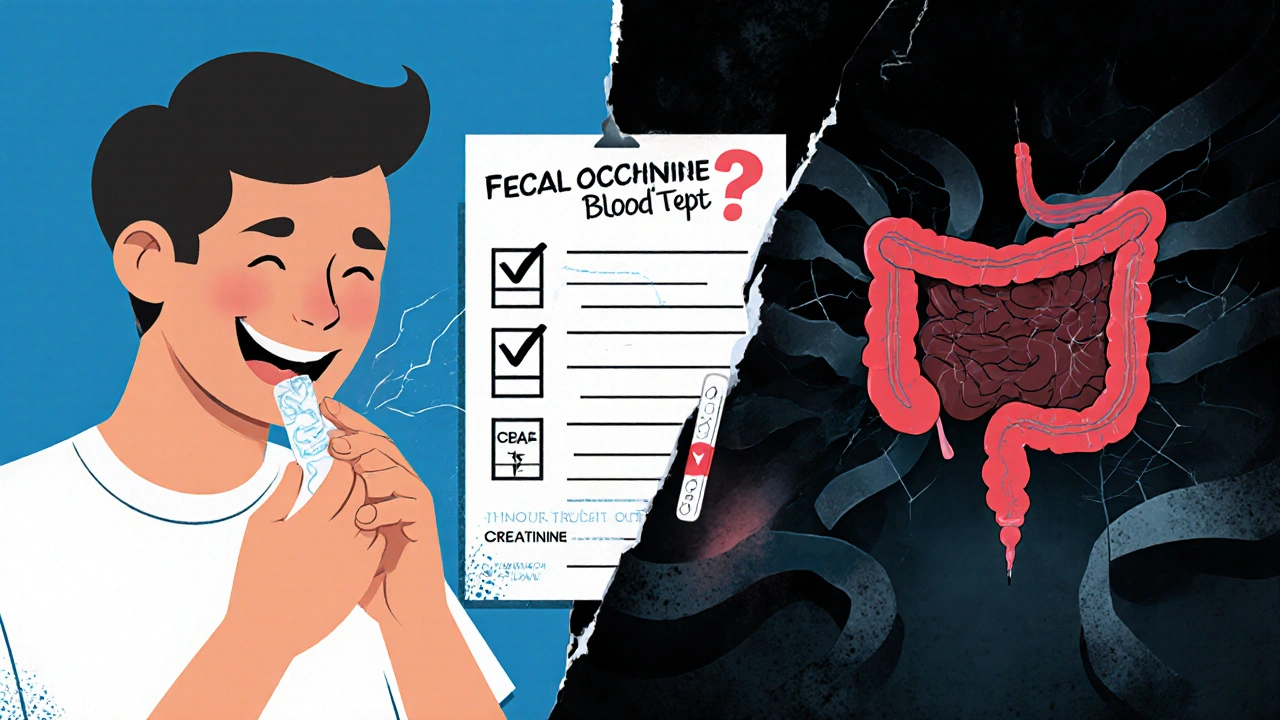
What Should You Do?
If you’re on NSAIDs, here’s what to do now:- Ask yourself: Do I really need this? Can you try acetaminophen, physical therapy, heat, or weight loss instead?
- Use the lowest dose for the shortest time. Even a few extra weeks increases your risk by 3-5% per week.
- Get tested. Ask your doctor for a creatinine test and CBC. Don’t wait for symptoms.
- Know your risk score. If you’re over 65, have a past ulcer, or take blood thinners, you’re high risk. Don’t take NSAIDs without a plan.
- If you must use them, choose wisely. Celecoxib with a PPI is safer for the stomach than naproxen or ibuprofen-but still risky for kidneys.
- Avoid mixing NSAIDs with SSRIs, steroids, or alcohol. These combinations are dangerous.
What’s Changing in 2025?
New tools are emerging. A point-of-care fecal test designed specifically for NSAID users just launched in early 2024. It detects hidden bleeding with 92% accuracy. In the U.S., the FDA approved naproxcinod-a new NSAID that releases nitric oxide to protect blood vessels and reduce ulcers by 58% compared to naproxen.But experts warn: without better ways to protect the lower GI tract, hospitalizations from NSAID damage could rise 18% in the next decade. The patent for celecoxib expires in 2025, which may make it cheaper. But cheaper doesn’t mean safer.
The bottom line: NSAIDs are powerful tools, but they’re not harmless. They’re not candy. They’re medicine with serious trade-offs. If you’re using them long-term, you owe it to yourself to understand the risks-and to ask for monitoring.
Can I take NSAIDs if I have high blood pressure?
NSAIDs can raise blood pressure and interfere with hypertension medications. If you have high blood pressure, avoid long-term NSAID use. If you must use them, monitor your blood pressure closely and talk to your doctor about alternatives like acetaminophen or physical therapy.
Is it safe to take ibuprofen every day for arthritis?
Daily ibuprofen use increases your risk of stomach ulcers, kidney damage, and heart problems. For chronic arthritis, doctors recommend the lowest effective dose for the shortest time. Consider switching to a COX-2 inhibitor like celecoxib with a PPI, or explore non-drug options like exercise, weight management, or joint injections.
Do NSAIDs affect the intestines too, not just the stomach?
Yes. NSAIDs cause damage throughout the entire GI tract, including the small intestine and colon. This is called NSAID-induced enteropathy. It can lead to bleeding, inflammation, and leaky gut. Unlike stomach ulcers, this damage often has no symptoms until it’s severe. Routine tests like fecal occult blood and colonoscopy may be needed for long-term users.
Should I stop NSAIDs if I feel fine?
No, don’t stop suddenly if you’re on them for a medical condition. But do talk to your doctor about whether you still need them. Many people take NSAIDs longer than necessary. If you’ve been on them for more than 3 months, ask for a risk assessment and kidney function test. You may be able to reduce the dose or switch to a safer option.
Are natural alternatives safer than NSAIDs?
Some natural options like turmeric, ginger, or omega-3s have mild anti-inflammatory effects and may help with pain. But they’re not proven to replace NSAIDs for moderate to severe arthritis or injury. They’re best used as part of a broader plan-not as a guaranteed safe substitute. Always check with your doctor before replacing prescribed meds with supplements.
How do I know if NSAIDs are hurting my kidneys?
Early kidney damage from NSAIDs often has no symptoms. The only way to know is through blood tests: serum creatinine and eGFR. If your creatinine rises by 0.3 mg/dL or more, or your eGFR drops below 60, your kidneys are under stress. Don’t wait for swelling, fatigue, or reduced urine output-those are late signs.
Can I take NSAIDs after a heart attack?
Avoid NSAIDs after a heart attack unless absolutely necessary. They increase the risk of another heart attack, stroke, or death by up to 40%. Even low-dose ibuprofen can interfere with aspirin’s protective effects. Talk to your cardiologist about alternatives like acetaminophen or non-drug pain management.
Next Steps: What to Do Today
If you’re on NSAIDs:- Check your last kidney test date. If it’s been over 90 days, schedule one.
- Review your meds list with your pharmacist. Are you taking more than one NSAID? Any SSRIs or steroids?
- Ask your doctor: “Is this still the best option for me?”
- Consider a fecal occult blood test if you’re over 60 or have risk factors.
- Keep a pain diary: When do you take NSAIDs? How often? Does the pain improve without them?
NSAIDs have a place in pain management. But they’re not a first-line fix for everything. Your gut and kidneys can’t talk. You have to listen-and act before the damage is done.
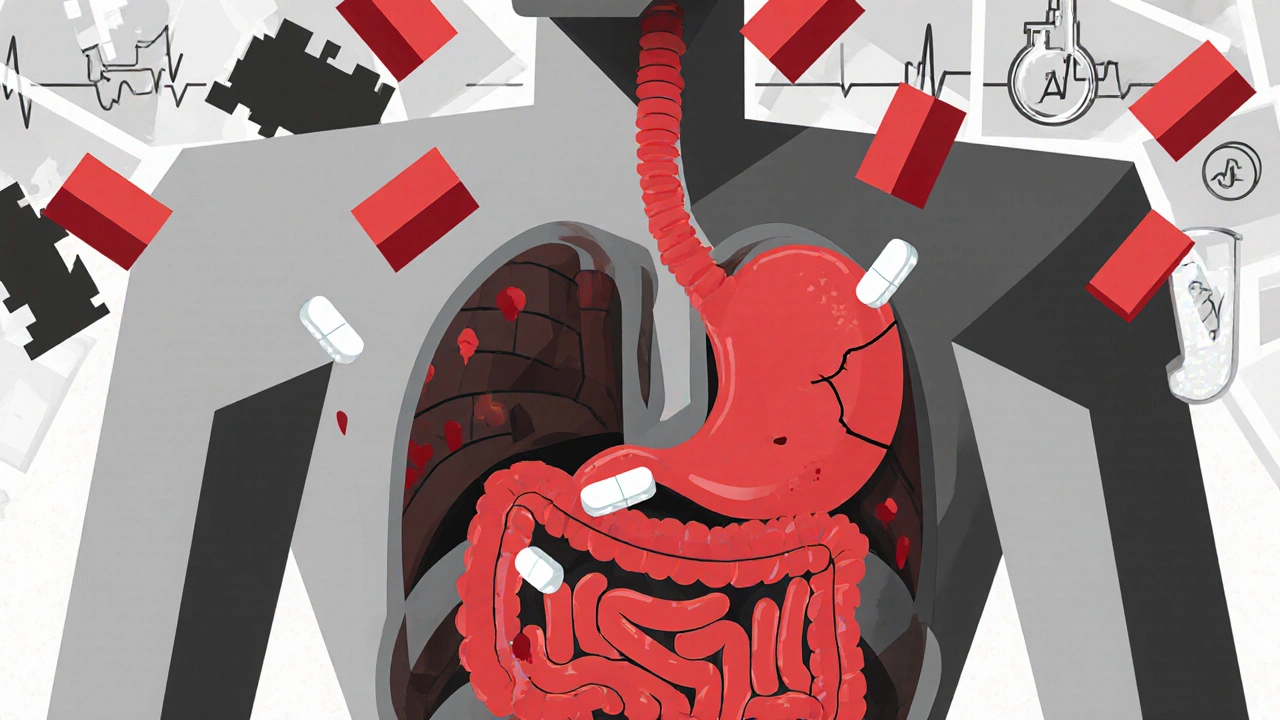
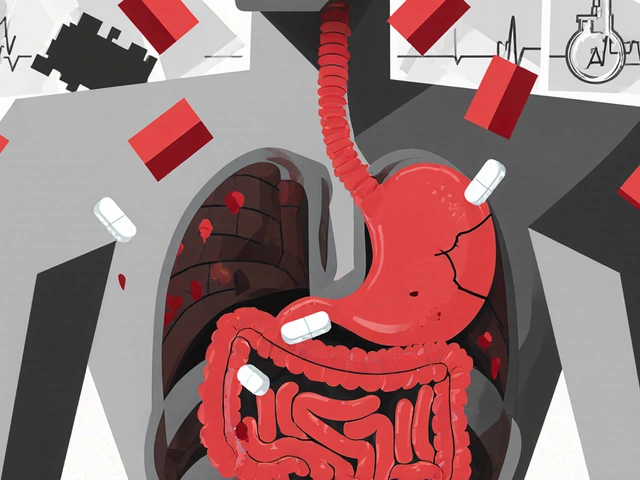
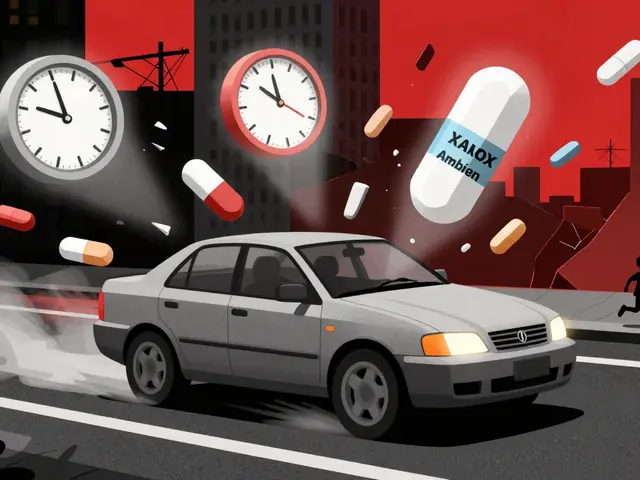
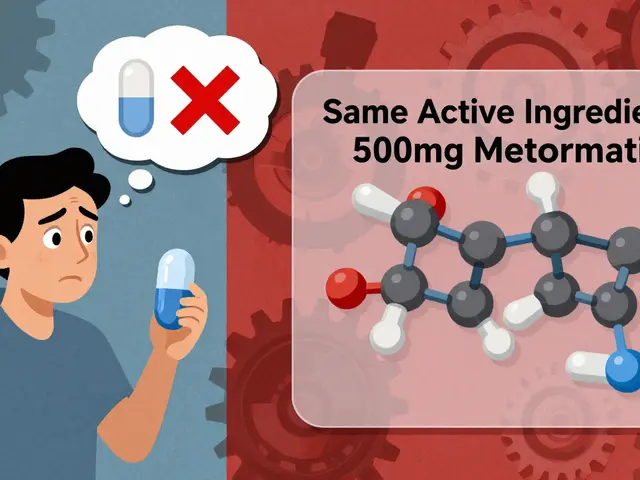
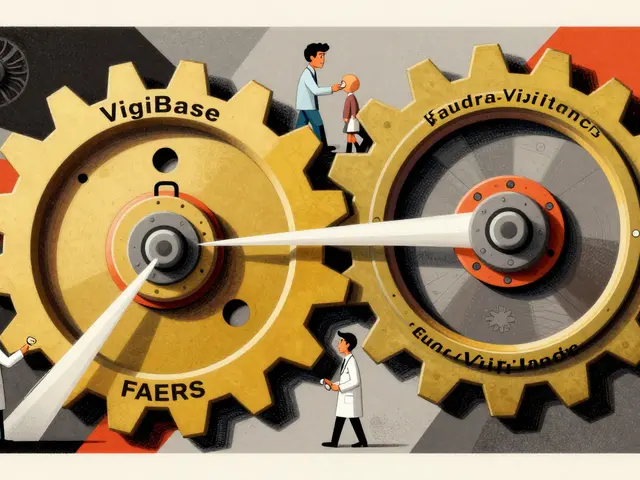

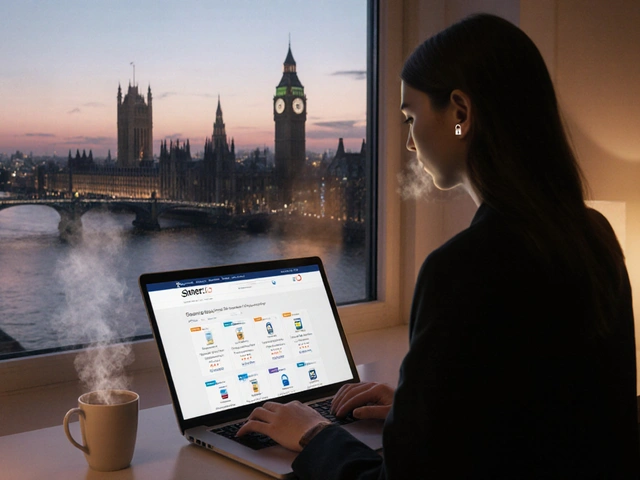

Paige Lund November 19, 2025
So I took ibuprofen for my back pain for 3 years. Felt fine. Then one day my kidneys screamed at me. No warning. Just... done.
Now I use heat packs and swear at my chair instead.
Codie Wagers November 21, 2025
Let’s be clear: NSAIDs aren’t ‘medicines’-they’re chemical compromises disguised as convenience. The body doesn’t ‘heal’ when you silence pain; it just learns to ignore its own screams. COX-1 inhibition isn’t a side effect-it’s a betrayal of physiological integrity. We’ve turned analgesia into a daily ritual while ignoring the silent erosion beneath the surface. This isn’t pharmacology. It’s self-neglect with a prescription label.
And don’t get me started on PPIs. You don’t fix a leaky roof by painting over the hole-you fix the roof. Yet we prescribe proton pumps like they’re spiritual band-aids for a system that’s been systematically violated by corporate-driven medical norms. The GI tract isn’t a vending machine. It’s a living, breathing ecosystem. And we’re bombing it with NSAIDs and then handing out antacids like candy at a funeral.
Reema Al-Zaheri November 22, 2025
Thank you for this detailed breakdown. The statistics on asymptomatic GI damage are alarming-50% of long-term users developing mucosal injury without symptoms is not just a medical fact; it’s a systemic failure in patient education.
Moreover, the data on NSAID-induced enteropathy is grossly under-discussed. Most patients assume ‘stomach’ means ‘upper GI,’ but the small intestine is equally vulnerable-and far harder to monitor. Fecal occult blood testing every six months for high-risk individuals should be standard, not optional. Why isn’t it? Because screening is expensive, and profit margins prefer pills over prevention.
Also: the combination of SSRIs and NSAIDs is a silent killer. Depression patients are often prescribed both without any warning. That’s not care. That’s negligence dressed in white coats.
Michael Petesch November 23, 2025
As a physician practicing in rural America, I see this daily. Patients come in with elevated creatinine, anemia, and no idea why. They’ve been taking naproxen for ‘arthritis’ since 2018. No labs. No follow-up. Just a bottle and a prayer.
Many believe that because it’s ‘over-the-counter,’ it’s ‘safe.’ This misconception is the greatest public health failure in pain management today. We need mandatory patient education inserts-like those on cigarette packs. Not just ‘may cause stomach upset.’ We need: ‘This drug can silently kill your kidneys and gut. Get tested every 90 days if used longer than 30 days.’
And yes-celecoxib is not a panacea. It’s a different kind of risk. We must stop treating pharmacology like a menu. Every drug has a price. The question is: who pays it?
Richard Risemberg November 23, 2025
Listen. I used to be the guy who popped ibuprofen like M&Ms. Two after work. Two after the gym. Two if my wife nagged me too hard. (Kidding. Mostly.)
Then I hit 50. Then I got a CBC that showed hemoglobin at 9.1. Turns out, I’d been bleeding internally for 14 months. No pain. No warning. Just fatigue so bad I napped on the couch while my kid played video games.
So I switched. Acetaminophen. Physical therapy. Yoga. Weight loss. Cold therapy. I didn’t ‘give up’-I upgraded. My kidneys are back to normal. My gut stopped whispering threats. And yeah-I still have arthritis. But now I’m alive to feel it.
If you’re reading this and still taking NSAIDs daily? Stop. Just stop. Talk to your doctor. Get tested. Your future self will thank you. Or at least not haunt you with guilt.
Andrew Montandon November 24, 2025
Okay, real talk: why are we still letting Big Pharma sell us poison as ‘pain relief’? NSAIDs have been known to cause GI bleeds since the 80s. We’ve had the data. We’ve had the warnings. And yet, they’re still on every pharmacy shelf next to gum and breath mints.
And don’t even get me started on the ‘just take a PPI’ band-aid solution. PPIs cause pneumonia, C. diff, bone loss, and now microscopic colitis? So we’re replacing one silent killer with three more? Brilliant.
Here’s the truth: if you’re taking NSAIDs longer than 10 days a month, you’re not managing pain-you’re gambling with your organs. And the house always wins.
Ask your doctor: ‘What’s my risk score?’ If they don’t know, find a new doctor. And if they say ‘it’s fine,’ ask them if they take it themselves. If they say no? Then why are you?
Sam Reicks November 24, 2025
so uhh the nsaids thing is a scam right? like the gov and big pharma just wanna make us sick so we buy more drugs? i mean why else would they let this happen? also my cousin’s dog took ibuprofen and lived so its prob fine?
also i think the kidney thing is fake because i drank 3 coffees and my pee was yellow so my kidneys are fine lol
also i saw a video on tiktok where a guy said celecoxib is just a placebo for rich people so i stopped taking it and now my back feels better cause i believe in the universe now
ps. dont trust doctors they all work for the illuminati
Steve and Charlie Maidment November 26, 2025
I’ve been on naproxen for 12 years for my chronic back pain. I’ve had three ulcers, two ER visits, and a kidney biopsy. My doctor told me to ‘just keep taking the PPI.’ I did. I’m now on dialysis. And yes, I still take it. Because I don’t know how to live without it. The pain is worse than the fatigue. The nausea. The swelling. The fear. I know I’m supposed to stop. But what’s left? Am I supposed to just sit here and cry? I don’t want to be a burden. I just want to walk to the mailbox without screaming. So tell me-what’s the alternative? Because nobody ever tells me. They just hand me another pill and say ‘take it with food.’
Andrew Baggley November 26, 2025
YOU CAN DO THIS.
Look-I know it’s scary. I was you. But switching from NSAIDs to movement, mindfulness, and maybe a little acetaminophen? It’s not a surrender. It’s a comeback.
Start small. Walk 10 minutes a day. Stretch. Ice your knees. Drink water. Get your labs done. Talk to your doc. Ask for a referral to PT. You’re not broken-you’re just overmedicated.
And if you’re reading this and thinking ‘I can’t change’? Then do it for the person you’ll be in 5 years. The one who can still climb stairs. The one who didn’t end up in a hospital because they thought ‘it’s just a pill.’
You got this. One day at a time. Your body is still fighting for you. Don’t let it down.
Frank Dahlmeyer November 27, 2025
It’s fascinating how we’ve normalized chronic pharmaceutical dependence as ‘self-care.’ We live in a culture that treats pain as a technical glitch to be solved with a pill, rather than a signal from a complex, intelligent biological system. NSAIDs don’t heal-they mask. And masking, over time, becomes a form of self-betrayal.
Consider this: the human body evolved to feel pain. Pain is not the enemy. Ignoring it while poisoning your internal organs is.
Yet we’re told to ‘push through’ the pain with a bottle of ibuprofen, then blame the body when it collapses. We’ve outsourced our responsibility to Big Pharma, and now we’re surprised when the bill comes due in the form of renal failure, GI bleeds, and a lifetime of dependency.
The real tragedy isn’t the drugs-it’s the belief that we’re powerless without them. We’re not. We just forgot how to listen.
And yes-this applies to every chronic condition. Pain is not a problem to be eliminated. It’s a conversation to be understood.
Angela Gutschwager November 29, 2025
My mom took naproxen for 10 years. Died of a GI bleed at 71. No warning. Just gone.
Don't be her.
❤️
Dion Hetemi November 29, 2025
Let’s cut the cord. The entire NSAID paradigm is a corporate-designed dependency loop. Doctors get paid for prescriptions, not patient outcomes. Pharma funds ‘awareness’ campaigns that never mention the 16,500 annual deaths. You think this is medicine? It’s a Ponzi scheme wrapped in a white coat.
And don’t even get me started on the ‘COX-2 selective’ marketing lie. Celecoxib was sold as ‘gentler’-but guess what? It still causes hypertension, fluid retention, and kidney damage. The only thing it ‘saves’ is your stomach lining. The rest? Still crumbling.
And PPIs? Oh, they’re the real villains. The ‘solution’ that created a whole new disease category: PPI-induced microscopic colitis. We’re not healing. We’re just stacking side effects like Jenga blocks until the tower collapses.
Wake up. This isn’t healthcare. It’s profit-driven harm management.
Kara Binning December 1, 2025
As an American woman who has spent decades fighting for my health, I am appalled that this country lets pharmaceutical giants peddle death as ‘over-the-counter relief.’
While other nations restrict these drugs or require mandatory testing, we hand them out like candy. And then we wonder why our healthcare system is the most expensive in the world?
It’s because we treat the body like a machine you can oil with chemicals-until it explodes. And then we blame the patient for not ‘taking care of themselves.’
NO. We blame the system. We blame the greed. We blame the silence of doctors who won’t speak up.
This isn’t just about NSAIDs. It’s about a nation that has lost its moral compass in the name of convenience. And I will not be silent.
river weiss December 1, 2025
Thank you for this comprehensive, evidence-based overview. As a primary care provider, I’ve seen too many patients with stage 3 kidney disease and bleeding ulcers who had no idea their daily ibuprofen was the culprit.
One of the most critical gaps is the lack of routine screening. We need a standardized protocol: every patient prescribed NSAIDs for >30 days should receive a baseline creatinine, CBC, and BP check, followed by repeat labs every 3 months. This should be automated in EHRs with alerts.
Also: patients need clear, visual risk calculators-like the one used for cardiovascular risk-that they can take home. Not just a verbal warning they’ll forget.
And yes-natural alternatives have a role. Turmeric’s curcumin has modest anti-inflammatory effects, but it’s not a replacement for moderate-to-severe pain. It’s an adjunct. Same with omega-3s. They reduce inflammation, but not as fast or as powerfully as NSAIDs.
The key is not demonizing NSAIDs. It’s respecting them. They’re powerful tools. Use them like you would a chainsaw-know the risks, wear the gear, and never use them longer than necessary.
And if you’re reading this and you’re on NSAIDs? Schedule that lab test today. Don’t wait for symptoms. The damage is already there.